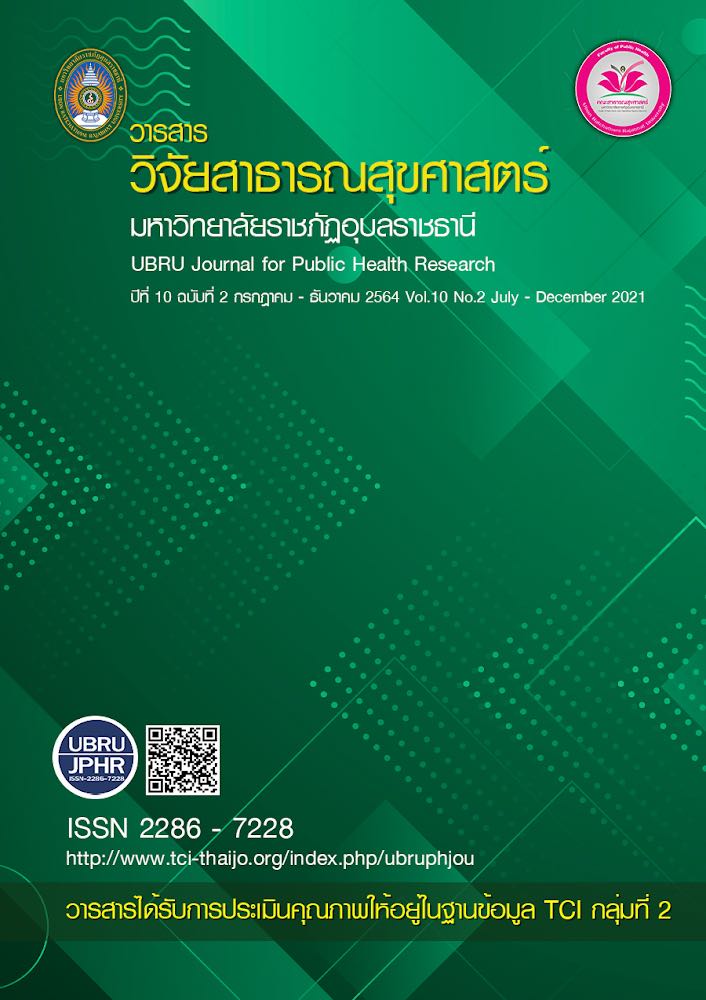ครอบครัวกับการจัดการโรคเรื้อรัง
คำสำคัญ:
ครอบครัว, การจัดการโรค, โรคเรื้อรังบทคัดย่อ
ในสถานการณ์ปัจจุบันการเจ็บป่วยด้วยโรคเรื้อรังเป็นปัญหาสุขภาพที่สำคัญทั้งในระดับประเทศและระดับโลก โดยพบว่ามีจำนวนผู้ป่วยด้วยโรคดังกล่าวเพิ่มมากขึ้นและนำมาสู่ผลกระทบทั้งต่อผู้ป่วย ครอบครัว สังคม และรวมถึงระบบสุขภาพ การจัดการโรคในผู้ป่วยที่เป็นโรคเรื้อรังจึงมีความสำคัญเป็นอย่างยิ่ง ซึ่งในการดำเนินการดังกล่าวให้เกิดประสิทธิภาพ จำเป็นที่จะต้องอาศัยการมีส่วนร่วมจากครอบครัวเนื่องจากครอบครัวเป็นบริบทที่มีความใกล้ชิดกับผู้ป่วย สมาชิกในครอบครัวเป็นผู้ที่ทำหน้าที่ดูแลกันมาอย่างต่อเนื่องยาวนาน โดยมีหลักฐานที่สนับสนุนว่าการดูแลและสนับสนุนจากครอบครัวมีความเชื่อมโยงกับการจัดการตนเองของผู้ป่วยและผลลัพธ์ทางด้านสุขภาพที่ดีขึ้น บทความนี้มีวัตถุประสงค์เพื่อนำเสนอประเด็นสำคัญที่เกี่ยวข้องกับการจัดการโรคในผู้ป่วยโรคเรื้อรังของครอบครัวในสองประเด็น คือ 1) ความจำเป็นของครอบครัวในการจัดการโรคเรื้อรัง และ 2) วิธีการส่งเสริมการมีส่วนร่วมของครอบครัว ซึ่งเนื้อหาทั้งสองประเด็นดังกล่าวจะแสดงให้เห็นถึงการส่งเสริมให้ครอบครัวมีส่วนร่วมด้วยวิธีการที่เหมาะสม อันได้แก่ การประเมินบทบาทและอิทธิพลของครอบครัวในปัจจุบัน การให้ความรู้ครอบครัวเกี่ยวกับโรคและการจัดการโรคเรื้อรัง ส่งเสริมให้สมาชิกครอบครัวมีการตั้งเป้าหมายในการดูแลผู้ป่วยอย่างชัดเจน และพัฒนาทักษะการสื่อสารของสมาชิกครอบครัวเพื่อให้การสนับสนุนอย่างมีประสิทธิภาพได้ในอนาคต
เอกสารอ้างอิง
Baig, A. A., Benitez, A., Quinn, M. T., & Burnet, D. L. (2015). Family interventions to improve diabetes outcomes for adults. Annals of the New York Academy of Sciences, 1353(1), 89.
Boot, D.M., M.C. Kapp, L.B.Johnson, and L.M. Magno. 2009. Disease Management for Chronically III Beneficiaries in Traditional Medicare. Health Affairs 28 (1); 86-98.
Chaiwong, C., Duangpaeng, S., & Masingboon, K. (2014). Factors influencing self-management behaviors among acute myocardial infarction patients. Thai Pharm Health Sci J, 9(3), 112-119.
Chesla, C.A., L. Fisher, M.M. Skaff, J.T. Mullan, C.L. Gilliss, and R. Kanter. 2003. Family Predictors of Disease Management Over One Year in Latino and European American Patients with Type 2 Diabetes. Family Process 42 (3); 375-390.
DiMatteo, M. R. (2004). Social support and patient adherence to medical treatment: A meta-analysis. Health Psychology, 23, 207–218. (American association for marriage and family, 2015).
Fallatah, F., & Edge, D. S. (2015). Social support needs of families: the context of rheumatoid arthritis. Applied Nursing Research, 28(2), 180-185.
Friedman, M-M.(1997). Family nursing: Research, theory and practice. 4th ed. East Norwalk, CT: Appleton & Lange.
Gallant, M.P. (2007). Help or Hindrance? How Family and Friends Influence Chronic Illness Self-Management Among Older Adults. Research on Aging 29 (5); 375.
Gallant, M. P. (2003). The influence of social support on chronic illness self-management: a review and directions for research. Health education & behavior, 30(2), 170-195.
Hogan, B. E., Linden, W., & Najarian, B. (2002). Social support interventions: Do they work?. Clinical psychology review, 22(3), 381-440.
Nicklett, E. J., & Liang, J. (2010). Diabetes-related support, regimen adherence, and health decline among older adults. Journals of Gerontology Series B: Psychological Sciences and Social Sciences, 65(3), 390-399.
Piette, J.D., M.A. Gregor, D. Share, et al. 2008. Improving Heart Failure Self-Management Support by Actively Engaging Out-of-Home Caregivers: Results of a Feasibility Study. Congestive Heart Failure 14 (1); 12-8.
Rintala, T. M., Jaatinen, P., Paavilainen, E., & Åstedt-Kurki, P. (2013). Interrelation between adult persons with diabetes and their family: a systematic review of the literature. Journal of Family Nursing, 19(1), 3-28.
Rosland, A. M. (2009). Sharing the care: The role of family in chronic illness. California Healthcare Foundation.
Sallis, J. F., & Owen, N. (2002). Ecological models of health behavior. In K. Glanz, B. K. Rimer, & F. M.Lewis (Eds.), Health behavior and health education. 3rd ed. 462-84). San Francisco: Jossey-Bass.
Sandberg, J., P.M. Trief, R.P. Greenberg, K. Graff, and R.S. Weinstock. 2006. He Said, She Said: the Impact of Gender on Spousal Support in Diabetes Management. Journal of Couple & Relationship Therapy 5 (2); 23-42.
Trief, P.M., J.Sandberg, R.P. Greenberg, et al. 2003. Describing Support: a Qualitative Study of Couples Living with Diabetes. Families, Systems & Health 21 (1); 57-67.
Uchino, B. N. (2006). Social support and health: a review of physiological processes potentially underlying links to disease outcomes. Journal of behavioral medicine, 29(4), 377-387.
Zala, P. (2017). Experiences of patients with chronic kidney disease and their family members in an advanced practice nurse-led counseling service. Nephrology Nursing Journal, 44(6).
ดาวน์โหลด
เผยแพร่แล้ว
รูปแบบการอ้างอิง
ฉบับ
ประเภทบทความ
สัญญาอนุญาต
เนื้อหาและข้อมูลในบทความที่ลงตีพิมพ์ในวารสารวารสารวิจัยสาธารณสุขศาสตร์ มหาวิทยาลัยราชภัฏอุบลราชธานี ถือเป็นข้อคิดเห็นและความรับผิดชอบของผู้เขียนบทความโดยตรงซึ่งกองบรรณาธิการวารสาร ไม่จำเป็นต้องเห็นด้วย หรือร่วมรับผิดชอบใดๆ
บทความ ข้อมูล เนื้อหา รูปภาพ ฯลฯ ที่ได้รับการตีพิมพ์ในวารสารนี้ ถือเป็นลิขสิทธิ์ของวารสารฯ หากบุคคลหรือหน่วยงานใดต้องการนำทั้งหมดหรือส่วนหนึ่งส่วนใดไปเผยแพร่ต่อหรือเพื่อกระทำการใดๆ จะต้องได้รับอนุญาตเป็นลายลักอักษรณ์จากบรรณาธิการวารสารนี้ก่อนเท่านั้น


